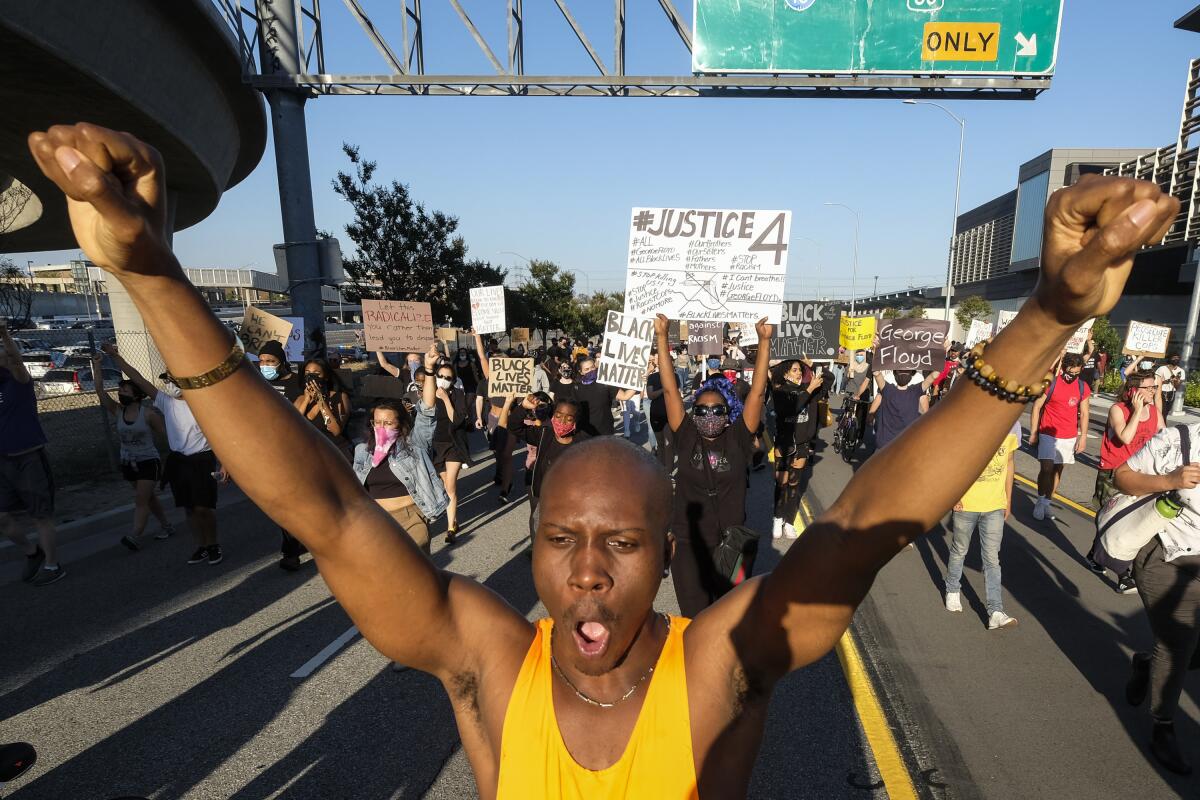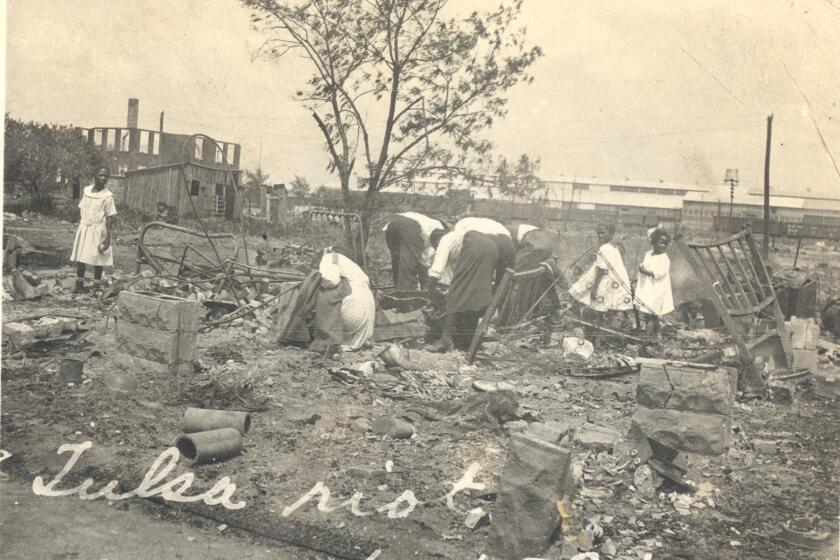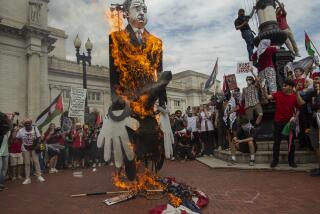Editorial: Another victim of the Floyd killing: The right to protest

On a night in mid-December 1773, a group of about 60 men who had disguised themselves as Native Americans boarded three merchant ships at a Boston wharf and dumped dozens of chests of imported tea into the cold dark waters — an act of civil disobedience that damaged private property in protest against government tax policies.
Conservatives these days hail that moment; in fact, a faction on the right a few years ago co-opted the name Tea Party as its own. Yet conservative state legislators across the country have been behaving less like the revolutionary rebels for whom they express admiration and more like British colonial overlords by introducing, and in some states passing, dozens of laws aimed at curtailing the fundamental right to public protest.
How counter-revolutionary.
The Times Editorial Board examines the reckoning of the last year and considers what it means for policing and protest in Los Angeles and elsewhere.
The murder of George Floyd by a Minneapolis police officer a year ago prompted waves of protests across the country, including here in Los Angeles. But Floyd’s killing was hardly the first such outrageous act by government officials, and the Floyd protests were not the first outpouring of anger and opposition to such acts. In fact, the Black Lives Matter movement so feared and reviled by the right began with a hashtag campaign after George Zimmerman’s 2013 acquittal in the death of Trayvon Martin.
It is in our national DNA to respond to the objectionable through public protest. Street actions in the late 1950s and the 1960s spurred watershed changes in civil rights protections and helped bring an end to U.S. involvement in the Vietnam War. Three decades of protests also helped change public awareness and national policy on nuclear energy and weapons. And don’t forget the 1999 anti-World Trade Organization protests, or the Occupy Wall Street movement a decade ago.
But some conservative politicians don’t like such protests. Since Donald J. Trump’s election as president — which spurred massive protests by women around the world — 45 states have considered a total of 226 bills addressing free assembly and free speech rights, many of which would restrict public protests or reduce protections for protesters, according to the International Center for Not-for-Profit Law, which focuses on supporting civil societies. Of those, 18 states — primarily Republican-led ones in the South and Midwest — have enacted 34 bills; 64 measures are still pending.
Montana, North Dakota, Texas and several other states increased penalties for people protesting near oil or gas installations, fallout from the protests against the Keystone XL pipeline; the measures seem to be part of a national campaign by the conservative pro-industry American Legislative Exchange Council, which drafted model language for the bills. North Dakota also made it a crime to wear a mask during a protest. Utah criminalized protests that disrupt public meetings. Florida made it so all protesters in groups of more than three can be held criminally liable if any of them damages property.
Anti-protest bills are of a piece with voter suppression efforts. They are attempts to shut off the political participation first of Black Americans, but also of anyone else moved to stand with them, or anyone who would stand against other actions that the government supports.
This is dangerous ground, no matter where on the political spectrum you may stand. Democracy is predicated on the free exchange of ideas and the ability of people to openly express support, opposition or even ambivalence regarding government actions.
Of course, the right to protest is not the right to rampage or block a highway or halt a pipeline or derail a public hearing. Yet we already have laws attending to those issues, and people engaged in civil disobedience anticipate that they will face arrests for their actions. It’s a step they are willing to take.
Tellingly, the same Republicans who rail about violent protests last summer seem to have no problem at all with the protesters who stormed the U.S. Capitol and assaulted police officers in hopes of overturning the results of a presidential election. For the record, had Trump’s supporters on Jan. 6 marched from his rally on the Ellipse to the police lines at the Capitol steps to decry the certification of Joe Biden’s victory, we would have defended their right to do so (while also blasting the lies they were espousing). But they didn’t do that; an assault on the seat of government to usurp democracy is not protest but insurrection.
All the same, the indefensible acts of property destruction and violence by the few cannot be used as a mechanism to muzzle the many — regardless of the content of the message. That includes voices that express hatred, racism and intolerance.
The best counter to a Klan rally is widespread voices raised in condemnation. We disagree with those who deny the existence of white privilege in our society, but they certainly have a right to utter their bigotry — and those who recognize the echoes of history have a right to offer counterarguments, whether these take place in quiet conversations, the letters pages of this newspaper, or on the streets of cities coast to coast in a spontaneous movement decrying police violence.
Democracy can be contentious, loud and messy. That’s the way ours began and the way it must continue. Elected officials in state capitals should not be allowed to undermine it.
This is the third in a series of editorials.
More to Read
A cure for the common opinion
Get thought-provoking perspectives with our weekly newsletter.
You may occasionally receive promotional content from the Los Angeles Times.











